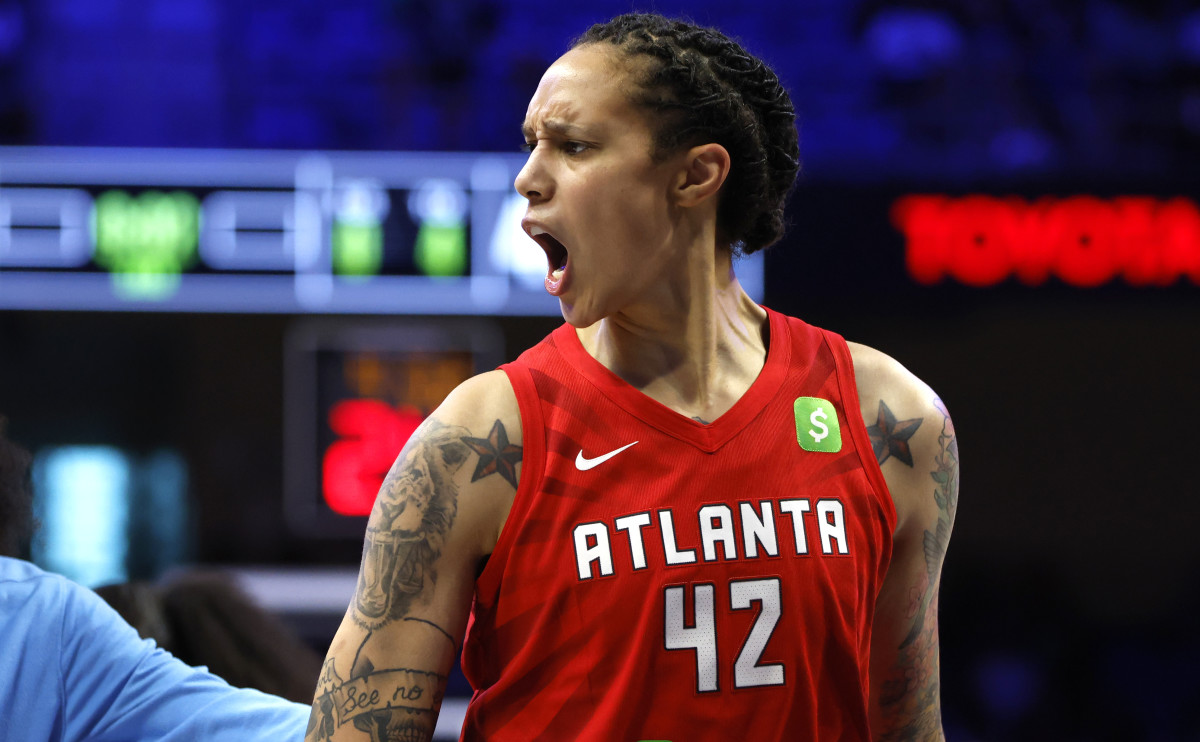In a headline-grabbing revelation that is reigniting national debate, WNBA star Brittney Griner has made it clear she has no plans to apologize after reversing her previously critical stance on the U.S. national anthem. The Phoenix Mercury center, who once refused to be present for the anthem in protest of social injustice, now stands alongside her teammates—yet she remains unapologetic for her past decisions.

A Shift in Stance, Not in Values
Griner’s change in posture was first noticed earlier this season when she began appearing on the court during the playing of “The Star-Spangled Banner.” Initially, fans speculated that the shift came from pressure or league mandates, but Griner has now set the record straight in a candid interview with ESPN’s Outside the Lines.
“I’m not turning my back on the things I stood for,” Griner said. “But I also recognize how complicated life can be. I’m standing for the anthem now, not because I’ve changed what I believe in—but because I’ve lived through something that gave me a new perspective.”
Griner, who was detained for 10 months in Russia in 2022–2023, said her time abroad made her reflect deeply on what it means to be American—even when the country isn’t perfect.
“I won’t apologize for using my voice. And I won’t apologize now for standing. Both are choices rooted in freedom—and that’s what I believe this country should be about,” she added.

A Divisive Public Reaction
Unsurprisingly, the public response has been divided. Many fans have welcomed Griner’s return to standing for the anthem as a moment of reconciliation and growth. But others accuse her of inconsistency—or even opportunism.
“She made her point. She protested. And now she’s showing maturity by standing again,” one fan tweeted. “That’s how democracy works.”
Yet critics on both sides of the aisle are voicing frustration. Some conservative voices claim Griner’s past protests disrespected the military and the country and that standing now doesn’t erase that. Meanwhile, some progressive activists feel let down, arguing that her shift sends the wrong message at a time when issues of racial injustice and inequality remain unresolved.

No Apologies—Only Transparency
Despite the backlash, Griner has remained composed and direct. She reiterated that her evolving stance should not be mistaken for regret.
“I know people want me to say I was wrong. But I wasn’t. I was standing up for what I believed was right then—and I still do,” she said. “But coming back from a Russian prison, I also saw things differently. The anthem doesn’t just belong to one group of people. It’s layered. It’s flawed. But it’s still a part of who I am.”
Griner also emphasized that her decision came without pressure from the WNBA or Phoenix Mercury leadership.
“They supported me either way,” she noted. “This was personal. Just me.”
A Symbol of Change, Again
This isn’t the first time Brittney Griner has been at the center of a cultural firestorm. She’s been a trailblazer throughout her career—not only as one of the most dominant forces in women’s basketball but also as an openly gay athlete, a Black woman speaking out on racial injustice, and a survivor of international imprisonment.
“She’s not afraid to evolve, and that’s powerful,” said Phoenix Mercury head coach Nate Tibbetts. “Too often we want our heroes to stay frozen in time. Brittney won’t do that. She’ll grow—and she’ll take the heat for it, too.”
Teammates also stood by her. “She’s earned the right to change her mind without being torn apart for it,” said teammate Diana Taurasi. “That’s what leadership looks like sometimes.”
A Bigger Conversation
Griner’s move is likely to reignite debate across not just sports media, but also political and social circles. The conversation touches on patriotism, protest, personal freedom, and the evolution of public figures under the microscope of fame and scrutiny.
With the 2025 WNBA season in full swing and Griner playing some of the best basketball of her career post-detainment, it’s clear she’s not letting controversy hold her back.
“I’ve been through hell,” she concluded in the interview. “And if standing for the anthem makes me a better teammate, a better person, or even just more at peace with myself—then I’ll stand. But I’ll never apologize for standing or for kneeling.”
Final Thoughts
Brittney Griner’s decision to now stand for the national anthem marks a complex, personal evolution rather than a political flip-flop. In choosing not to apologize, she reinforces a key tenet of the American experience: the right to protest, the right to reflect, and the right to change—without fear of condemnation.
Love her or hate her, Brittney Griner continues to spark the kind of dialogue that transcends the hardwood—and forces us all to think harder about what it really means to be free.





